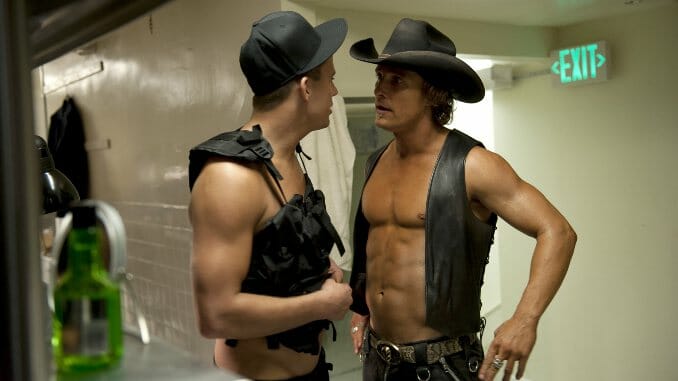Magic Mike Remains a Paramount Representation of (Male) Sex Work

People have a hard time talking about sex work. Whether it’s pornography or strip clubs, the topic remains taboo regardless of how far our society veers from its puritanical roots. Many focus on the danger sex work can pose to women—in fact, a 2017 study suggests that it is the most dangerous profession, with its violence disproportionately affecting women. But another critical reason for our societal fear of sex work (and a reason people are much less keen to admit) is that female desire has always been deemed a scary thing. Eve’s desire begat the downfall of humanity. The sirens are seen as more monstrous than even the Cyclops. Hell, in the Twilight franchise, Bella’s sex drive gets her impregnated by a bloodsucking vampire that almost eats her from the inside out. On the other hand, there’s an entire subgenre that revolves around the male sex-odyssey: Wedding Crashers, Superbad, The 40-Year-Old Virgin, just to scratch its modern surface. While sex work on film almost always centers women, it’s clear that cinematic sex is a totally different ballgame depending on who’s seeking it out. In 2012, Stephen Soderbergh came out with the strangely revolutionary Magic Mike, a movie about male strippers that complicated these norms.
Non-judgmental films like Magic Mike, where the stigma surrounding sex work isn’t the focus, can be a bit of a shock to the system. This is especially true since, partially due to the male outrage that often ensues when a woman takes her sexuality into her own hands (using it for something other than male pleasure), films that center female sex work tend to be a little…grim.
In Luis Buñuel’s 1967 Belle de Jour, the protagonist’s husband is shot and permanently injured because she enlists in a brothel. Ninja Thyberg’s 2022 Pleasure studies an aspiring porn star who, despite her passion for the industry, is put in countless dangerous situations on the job. It is a film that advocates for sex-positivity, but cannot move past the harsh reality that sex work is inherently more risky for women than it is for men. Other films that spotlight sex workers focus instead on the gendered double standards inherent in the field. Stephen Elliot’s About Cherry sees porn star Cherry (Ashley Hinshaw) chastised by her boyfriend; she escapes judgment not by abandoning her career, but by entering a relationship with a woman. In Boogie Nights, Paul Thomas Anderson’s sprawling venture into the California porn industry of the ‘70s and ‘80s, characters like Amber (Julianne Moore) and Rollergirl (Heather Graham) are denigrated purely because they have sex on camera. But when the lives of men like Eddie (Mark Wahlberg) go to pieces, it has nothing to do with sex and everything to do with a sense of ego and pride that women are not afforded. For them, society demands shame be an occupational hazard.
The idyllic, lucrative life lived by Channing Tatum’s young stripper, Mike, begins falling apart at the seams when his co-worker Adam (Alex Pettyfer) starts using heavy drugs, incurs a number of debts with sketchy individuals and gets into some serious fights. But while sex work involving women is usually portrayed as ostracizing or life-threatening, the sense of risk throughout Magic Mike has little to do with their work. The most danger a character is ever in in the film, in fact, is when Adam enters into a drug-dealing scheme with a DJ named Tobias (Gabriel Iglesias).
Similarly, when Mike’s love interest, Brooke (Cory Horn), turns him down, it has nothing to do with his work, and everything to do with the fact that his stripping-adjacent lifestyle is dangerous. Juxtapose this with the breakup scene from About Cherry, where Frances (James Franco) calls his girlfriend disgusting for having sex on camera, and the double standards couldn’t be more evident.
-

-

-

-

-

-

-

-

-

-

-

-

-

-

-

-

-

-

-

-

-

-

-

-

-

-

-

-

-

-

-

-

-

-

-

-

-

-

-

-








































